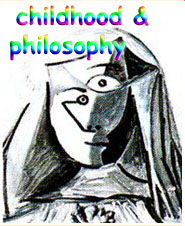meeting youngsters where they “are at” in summer camps, in sport and in life.
DOI:
https://doi.org/10.12957/childphilo.2019.45887Keywords:
non-hierarchical teaching, training in soccer, non-authoritarian teaching, philosophy for children.Abstract
When Mathew Lipman first introduced Philosophy for Children (P4C) to the world, his goal was not to sneak a little academic philosophy into the typical school curriculum, as one might expect from the titles of his first books: Philosophy in the Classroom (Lipman et al., 1980) and Philosophy Goes to School (Lipman, 1988). His goal, rather, was to create a paradigm shift in the field of education itself: namely, to transform the typical hierarchical model into one in which the teacher/facilitator solicits responses from students and hence, in that sense, meets them where they “are at.” This non-hierarchical model, however, has stumbled in taking root, which is, perhaps, not surprising given that the hierarchical model, whether in school, in sport or in the home, appears to be so much easier and so much more efficient. If those of us who support a non-hierarchical model in all these arenas are serious about furthering this approach, it would appear that the onus lies with us to articulate precisely in what ways a hierarchical model falls short. In so doing, we will not only provide ourselves with a precise framework by which to make the case for the importance of adopting a non-hierarchical approach, we will also provide ourselves with a metric whereby we can measure whether our own non-hierarchal practice is true to its justification; and that the approach is not simply non-hierarchal for sake of being non-hierarchical, nor quasi-authoritarianism for the sake of more wide-spread acceptance. It is the articulation of the flaws of a hierarchical model that non-hierarchal model can (and should) correct that will be the focus of the analysis here
Downloads
References
Arendt, Hannah. (1958/2013.) The Human Condition. Chicago: University of Chicago Press.
Robert A. Burton. (2008) On Being Certain: On Believing That You Are Right Even When You Are Not. New York: St. Martin’s Griffin.
Buber, M. (1958). I and Thou. 2nd Ed. New York: Charles Scribner’s Sons.
Freire, Paulo (2018) Pedagogy of the Oppressed, New York, NY: Bloomsbury Publishing.
Friedman, Thomas L. (2005) The World is Flat: A brief History of the Twenty-First Century. New York: Farrar, Straus and Giroux.
Gardner, Susan T. (2011) “What Would Socrates Say to Mrs Smith?” Philosophy Now. Issue 84. May/June 24-26.
Gardner, Susan T. (2015) Inquiry is no mere conversation. First published in The Australian Journal for Critical and Creative Thinking, Vol. 3, No. 2, October, 1995, pp. 38-49. Then in Analytic Teaching, April 1996, Vol. 16, no. 2, pp. 41 – 50. Finally, in Journal of Philosophy in Schools 2(1), 2015. 71-91
Gardner. Susan T. and Daniel J. Anderson. (2015) “Authenticity: It Should and Can Be Nurtured,” Mind, Culture, and Activity. 22 (4) (Oct.): 392-401.
Gardner, Susan T. And Wolf, Arthur.(2019) “Thinking And Knowledge, The Past And The Future: An Energized Mesh.“ (Under consideration.)
Guru, T.G. (n.d.). Germany focus on ‘fun and joy’ to reverse decline. Retrieved from
http://trainingground.guru/articles/germany-focus-on-fun-and-joy-to-reverse-decline
Habermas, J. (1992, German text 1981) The Theory of Communicative Action. (TCA) Vol. 1: Reason and the Rationalization of Society. Trans. Thomas McCarthy. Boston: Beacon Press.
Kennedy, David (2006) The Well of Being: Childhood, Subjectivity, And Education.
Albany: State University of New York Press.
Lehrer Jonah (2010). How We Decide. New York: Mariner Books.
Kohan, Walter Omar. (2011) “Childhood, Education and Philosophy: Notes on Deterritorialisation.” Journal of Philosophy of Education, Vol. 45, No. 2. 339-357.
Lipman, Matthew, Ann Margaret Sharp, Frederick S. Oscanyan. (1980) Philosophy in the Classroom. Philadelphia: Temple.
Lipman, Matthew. (1988) Philosophy Goes to School. Philadelphia: Temple.
Lipman, Matthew. (1991) Thinking in Education. Cambridge: Cambridge UP.
Merkel. D. (2013). Youth sport: Positive and negative impact on young athletes. Open Access Journal of Sports Medicine, 151. Doi:10.2147/oajsm.s33556.
Schertz, Matthew. (2007) “Avoiding ‘passive empathy’ with Philosophy for Children.” Journal of Moral Education Vol. 36, No. 2, June, pp. 185–198.
Sharp, Ann Margaret (2004/2018) “The Other Dimension of Caring Thinking.” In Community of Inquiry with Ann Margaret Sharp: Childhood, Philosophy, and Education. Edited by Maughn Rollins Gregory and Megan Jane Laverty. New York: Routledge.
Thoreau, Henry David (1910). Walden. N.Y. Thorny Cromwell.
Wolf, Arthur and Susan T. Gardner. (2018) “An Education for “Practical” Conceptual Analysis in The Practice of “Philosophy for Children.” Analytic Teaching and Philosophical Praxis. Fall.




